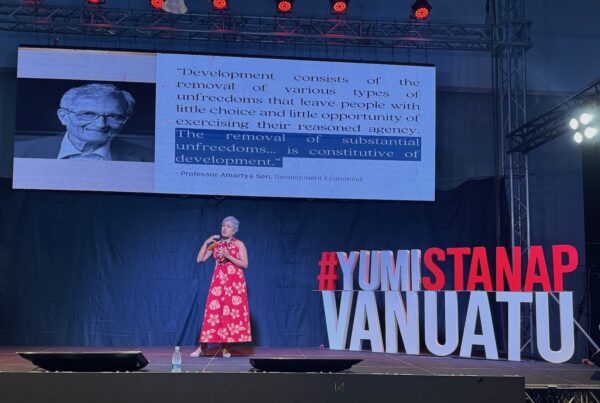By Howard Aru
Power corrupts and absolute power corrupts absolutely. English historian Lord Acton could have said that of Vanuatu’s case since the early 1990s. Political interference in daily administrative matters was rampant. Corrupt political decisions drained the country’s financial resources to the brink of bankruptcy. That’s why the country had to surrender to the ADB-led reforms of 1997/1998. Hundreds of jobs were made redundant in order to ‘right-size’ the Government.
As part of the reforms, political interference was to be eliminated from daily administrative duties vested in directors and Directors General (DGs). Numerous laws were enacted to enable the country’s administration to function professionally. So we thought. Vanuatu was destined to be a perfect role model for the rest of the Pacific in good governance, accountability and transparency – the three fundamental pillars of effective administration, often linked to noble principles such as responsiveness, participation, and the rule of law.
The reforms were designed to make Vanuatu perform better than big brother Papua New Guinea (PNG) with its perennial law and order issues, Fiji with its bad history of military coups, and the Solomon Islands with its corruption, notably in the forestry/logging sector. We were poised to become the Pacific’s ‘Shining Star.’ But we did not see the looming threat – ‘Administrative Powers’ had to be concentrated in very wrong hands. Not all, but still unacceptable. These powers were entrusted via numerous pieces of legislation to certain esteemed select group – departmental directors! DGs to some extent, but directors in particular, and other similar positions. Vanuatu’s graduation on 4th Dec 2020 from Least Developed Country (LDC) to Developing Country (DC) status was acclaimed as a ‘significant milestone.’ We announced this achievement to the whole world. Meanwhile, deep within, the administrative system was rotting at the seams, and in the hands of those whom the leaders entrusted those APs! But what are APs?
Administrative powers gone wrong
AI provides a succinct description of these: “Vanuatu government directors, or DGs, hold significant administrative powers including leadership and management of their departments, staff, and operations, along with direct control and supervision over finance and administrative units. They are responsible for the implementation and enforcement of legislative frameworks and have the authority to manage and expend public funds in accordance with appropriation acts. These powers include the ability to authorise expenditure, control of the release and use of funds.”
These powers were confered on them over time via laws initially passed by parliament as part of the CRP in 1998. Limiting political interference in administrative leadership was a great idea. As a former DG, the knowledge of the fact that great laws protected my work and ensured my job security provided a real sense of comfort and confidence.
However, over the past 27 years since greater APs were granted to directors, we have seen mixed results. Commendable in some departments, while dubious in others – key departments in particular. A new complicit culture gradually emerged and crept into the ranks. One characterised by subtle or forthright arrogant insubordination, bidheadedness, carelessness, and the big one – corruption!
Organisations such as Transparency International Vanuatu (TIV) have often blamed politicians about corruption. True. But it appears the TIV hasn’t done enough to address the monster lurking within and eating organisations from the inside, like ‘termites in the system’ – to use a phrase coined by Jagdish Bhagwati. Abuse of power, maladministration, bribery and unexplained wealth, increasingly became obvious. The TIV should take a serious look into these, if it really wants to address corruption ‘in high places’ in the country. Take for instance, the ‘director’ who has built himself a huge mansion on a very expensive property (unexplained wealth!), or the former organisational director who has amassed a huge amount of wealth over a very short period of time – properties, vehicles, machineries, etc. – when obviously his normal salary can’t afford these assets. Has the TIV ever tried to investigate these kinds of blatant evidences of ‘unexplained’ wealth or not?
What’s more disturbing though is how directors sit on powers granted to them by law and derail timely action. Normally these kinds of individuals hide behind three layers of protection to shield their behaviors – i) those laws that empower and protect them; ii) the Public Service Commission’s (PSC) cumbersome disciplinary processes; and iii) the usual scapegoats they provide about established ‘processes’ and ‘procedures’ to get things done. In mid-July, The Distant Voice highlighted the fact that “evidence-based analysis carried out by Sector Analysts at DSPPAC reveals an alarming state of dismal underperformance by all Government Ministries over the past three years (2022-2024).” There’s been “a consistent and concerning decline in government performance, specifically regarding ministries’ achievement of Business Plan Service Targets over the three-year period,” which in DSPPAC’s view amounted to ‘Grade C’ type services to clients. Diversion of resources to run costly events is a big issue, but this does not explain the red tape and unnecessary lengthy, never-ending delays that affect service delivery by departments to clients – both local and foreign.
Ways forward?
The PSC’s intentions to return directors to contract is perfectly timely, “to foster a productive environment.” One of our current DGs has even raised his concerns about the powers vested in one or two of his directors, who also defy directions issued to them by him. That’s why Directors must be contracted. The PSC leadership though needs to be very cautious in how it progresses with other related measures. Its proposed ‘Time and Attendance Policy’ is a particularly risky one. The issue of ‘time management’ is true. But this needs to be very carefully thought out to avoid backfiring on Ministries and the PSC itself. A blanket approach to ‘hourly-based payment’ of salaries might not work in all circumstances. Some good commentators on social media have warned about a potential new wave of ‘brain drain’ being triggered by this policy, which the PSC may need to objectively review before it makes a final decision on it.
In my experience as former DG, and from observation, some of our current administrators need to improve on a number of vitally important areas. These could help to improve staff performance across the board. First, focus on key objectives, key result areas and key performance indicators. Remain focused! Reduce excessive wasted time on fighting fires and crisis management. Second, issue strict deadlines for key tasks to be completed and demand that of your staff. Deadlines are deadlines. Time waits no one (More on this in a future article.). Third, follow up, follow through. This is an area that needs major improvements. When you assign a task, systematically follow up and follow it through. If you don’t, you will not achieve your intended output/outcome on time. Fourth, discipline. This is lacking in numerous government agencies. Effective staff discipline fosters a productive and professional work environment by establishing clear expectations for behaviour and performance, correcting misconduct, promoting employee accountability, and ensuring adherence to policies and standards. It also protects the organisation’s reputation and interests, ultimately benefiting both the staff and the organisation. In our context, discipline is either non existent, carelessly done, or a very long and tedious process.
That’s why public officials always tend to get away with non-performance.
Finally, simplify those unnecessarily lengthy processes and procedures. If other neighbouring countries can do it and still progress and advance better than Vanuatu, what are we trying to prove? Don’t make laws, processes and procedures an excuse for your non-performance while you keep getting paid. Officials are paid to proactively advance development work, not to put up barriers and then spend their time and effort defending those roadblocks.
Imagine one day finishing from the job you currently occupy, then returning to seek support through the very same dept/Ministry you once headed. Would you prefer efficient and speedy service or being told you need to comply with an overcomplicated process you yourself established when you were head of the institution? Make life simple for others. You may want to be treated the same way in the future.

While Howard Aru has held senior roles in various Government ministries, institutions, and the private sector, the views expressed here are solely his own and do not represent those of any organisation with which he is affiliated.





